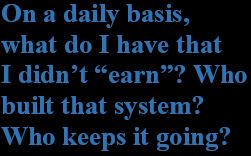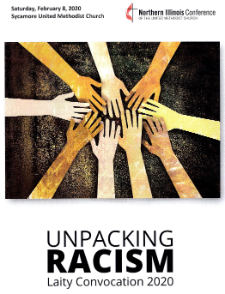This article is part of a series of posts based on the 2020 Laity Convocation of the Northern Illinois Conference of the United Methodist Church. Go to the Lead Post in this series for a complete list of articles. Below is PART 2 of Rebecca Fraley‘s talk on the meaning of White Privilege.
Read Part 1 of her comments.
Part 2 of Rebecca Fraley’s talk explores several aspects of White Privilege, the first two below based largely on Peggy McIntosh’s famous essay, “White Privilege: Unpacking the Invisible Knapsack.”
____________________
“As Peggy McIntosh asked herself, inspiring her famous essay: ‘On a daily basis, what do I have that I didn’t earn?’ We need to ask ourselves ‘Who built that system?’ and ‘Who keeps it going?’
White Privilege as the “Power of Normal”
“Some subtle versions of white privilege can be used as a comfortable starting for people to begin the discussion—some simple everyday conveniences/things that white people are not forced to think about: ‘flesh-colored’ band-aids in your first-aid kit, the ‘hair-care’ aisle versus the smaller separate section of ‘ethnic hair products,’ ‘ethnic foods’ section in large grocery stores.
White Privilege as the “Power of the Benefit of the Doubt”
“The media (print, TV shows, movies, news) show more positive portrayals of white people. White people are less likely to be followed, interrogated, or searched by law enforcement for ‘looking suspicious.’ If accused of a crime, white people are less likely to be presumed guilty and/or sentenced to death. Just as people of color did nothing to deserve this unequal treatment, white people did not ‘earn’ disproportionate access to compassion and fairness. They receive it as the byproduct of systemic racism and bias.
White Privilege as the “Power of Accumulated Power”
“The power of ‘normal’ and ‘benefit of the doubt’ would not exist if systemic racism hadn’t come first. And systemic racism cannot endure unless those powers still hold sway. Imagine it as a sort of ‘whiteness water cycle,’ where racism is the rain. That rain populates the earth, giving some areas more access to life and resources than others. The evaporation is white privilege, an invisible phenomenon that is both a result of the rain and the reason it keeps going.
“For example, the ability to accumulate wealth has been a long-standing white privilege created by overt systemic racism in both public and private sectors. Wealth passed from one generation to the next in the form of inherited property, college educations, increased earning power. The cycle continues…
 “Post WWII, the GI Bill provided white veterans with a ‘magic carpet ride to the middle class.’ Racist zoning laws segregated towns and cities, redlining by the Federal Housing Administration built discrimination right into building codes, resulting in people of color being denied opportunities to raise their children and invest their money in neighborhoods with high home values. The cycle continues…
“Post WWII, the GI Bill provided white veterans with a ‘magic carpet ride to the middle class.’ Racist zoning laws segregated towns and cities, redlining by the Federal Housing Administration built discrimination right into building codes, resulting in people of color being denied opportunities to raise their children and invest their money in neighborhoods with high home values. The cycle continues…
“So although it is not necessarily a privilege to be white, it certainly has its benefits. White people can generally count on police protection rather than harassment. Depending on their financial situation, white people can choose where they want to live and choose safer neighborhoods with better schools. White people are given more attention, respect, and status in conversations. Nothing white people do is qualified, limited, discredited, or acclaimed simply because of our racial background. White people don’t have to represent their race and their actions are not judged as a credit to their race or as confirmation of its shortcomings or inferiority.
“‘It’s not that white Americans have not worked hard and built much. We have. But we did not start out from scratch. Much of the rhetoric against more active policies for racial justice stem from the misconception that all people are given equal opportunities and start from a level playing field…’ (Source: Showing up for Racial Justice)”
Main Sources: “What is White Privilege, Really? Recognizing white privilege begins with truly understanding the term itself,” Cory Collins, Teaching Tolerance (Issue 60, Fall 2018); “White Privilege: Unpacking the Invisible Knapsack,” Peggy McIntosh (1988).
_________________________
Not acknowledging White Privilege is one of the root reasons racism remains so intractable, long lasting, and deep. Yet acknowledging this is one of the hardest things to do. To add a little to Rebecca Fraley’s thoughts, we Americans, for one thing, believe that everyone’s on a level playing field, and that everything we’ve achieved we’ve done basically on our own, with little help. We’re a pull-yourself-up-by-your-bootstraps kind of country (although that move is physically impossible!), and anyone who doesn’t just isn’t trying. Going further, whites often evade their privilege by charging reverse discrimination. Because I’ve spent most of my career in colleges, I’ve written that I don’t deny that every now and then a person of color gets in because of their race, but for every one person whom race helps there are at the very least 10,000 persons who, because of racism, never even get a serious chance to apply. Please also note the following:
♦ For more on Fraley’s comments on accumulating wealth, watch Season 1: Episode 1 of the Netflix series Explained. It’s on the “Racial Wealth Gap,” and spends significant time on the importance of HOME OWNERSHIP, the main focus of The Neighbor Project, an organization begun when my oldest son Rick and wife Desiree started Emmanuel House as a living memorial to his youngest brother Bryan Emmanuel Guzman.
♦ For more on educational inequality go to “A Return to Plessy vs. Ferguson?,” an article based largely on Rick Guzman’s law school monograph on education. Upon graduation he received the Thurgood Marshall Prize for his contributions to education.
♦ Go to the Teaching Diversity main page.
